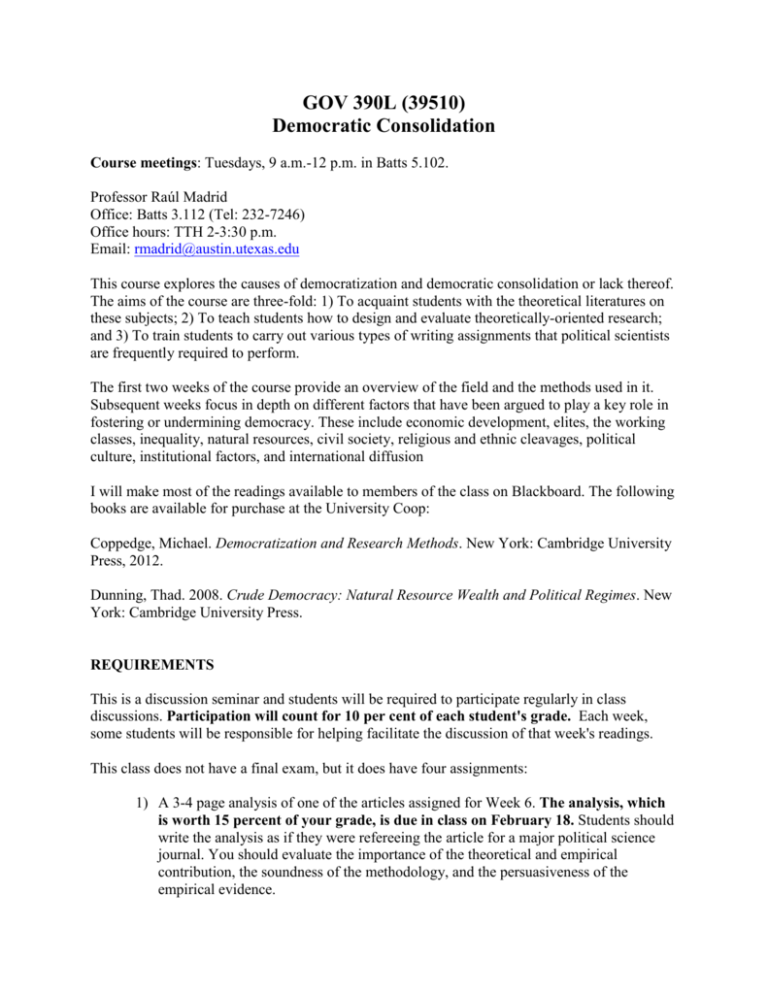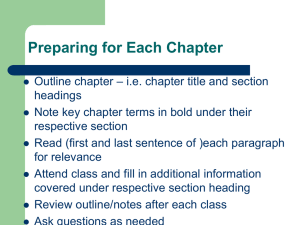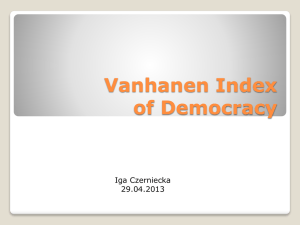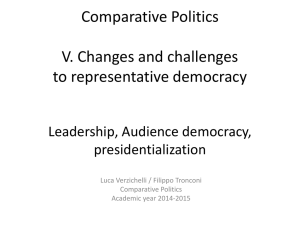
GOV 390L (39510)
Democratic Consolidation
Course meetings: Tuesdays, 9 a.m.-12 p.m. in Batts 5.102.
Professor Raúl Madrid
Office: Batts 3.112 (Tel: 232-7246)
Office hours: TTH 2-3:30 p.m.
Email: rmadrid@austin.utexas.edu
This course explores the causes of democratization and democratic consolidation or lack thereof.
The aims of the course are three-fold: 1) To acquaint students with the theoretical literatures on
these subjects; 2) To teach students how to design and evaluate theoretically-oriented research;
and 3) To train students to carry out various types of writing assignments that political scientists
are frequently required to perform.
The first two weeks of the course provide an overview of the field and the methods used in it.
Subsequent weeks focus in depth on different factors that have been argued to play a key role in
fostering or undermining democracy. These include economic development, elites, the working
classes, inequality, natural resources, civil society, religious and ethnic cleavages, political
culture, institutional factors, and international diffusion
I will make most of the readings available to members of the class on Blackboard. The following
books are available for purchase at the University Coop:
Coppedge, Michael. Democratization and Research Methods. New York: Cambridge University
Press, 2012.
Dunning, Thad. 2008. Crude Democracy: Natural Resource Wealth and Political Regimes. New
York: Cambridge University Press.
REQUIREMENTS
This is a discussion seminar and students will be required to participate regularly in class
discussions. Participation will count for 10 per cent of each student's grade. Each week,
some students will be responsible for helping facilitate the discussion of that week's readings.
This class does not have a final exam, but it does have four assignments:
1) A 3-4 page analysis of one of the articles assigned for Week 6. The analysis, which
is worth 15 percent of your grade, is due in class on February 18. Students should
write the analysis as if they were refereeing the article for a major political science
journal. You should evaluate the importance of the theoretical and empirical
contribution, the soundness of the methodology, and the persuasiveness of the
empirical evidence.
2) A 5-6 page book review of Crude Democracy. The book review, which is worth 20
percent of your final grade, is due in class on March 18. Each review should
summarize and evaluate the theoretical arguments and empirical evidence presented
in the book. You should write the review as if you were writing it for a major journal.
3) An 8-10 page review essay analyzing the articles on ethnic diversity and democracy
assigned for Week 13. The review essay, which is worth 25 percent of your grade,
is due in class on April 15. The essay should compare and contrast the
articles/chapters assigned for that week, pointing out theoretical, methodological, and
empirical problems. It should also identify a research agenda for the future.
4) An exam worth 30 percent of your grade, which will take place on the last day of
the class: April 29. This exam will be modeled on the comprehensive exam in
comparative politics. Students will have to answer two questions on democratization
or democratic consolidation. You will need to make an argument that addresses the
question, but also demonstrate your familiarity with the literature on the topic by
analyzing and critiquing it.
Plus/minus grading will be used in this course.
Students with disabilities may request appropriate accommodations from the Division of
Diversity and Community Engagement, Services for Students with Disabilities, 471-6259,
http://www.utexas.edu/diversity/ddce/ssd/
Students who need to miss a class due to a religious holiday should notify me at least fourteen
days prior to the holiday. If you must miss a class, an examination, a work assignment, or a
project in order to observe a religious holy day, you will be given an opportunity to complete the
missed work within a reasonable time after the absence.
Policy on Scholastic Dishonesty: Students who violate University rules on scholastic dishonesty
are subject to disciplinary penalties, including the possibility of failure in the course and/or
dismissal from the University. Since such dishonesty harms the individual, all students, and the
integrity of the University, policies on scholastic dishonesty will be strictly enforced. For further
information on academic integrity and plagiarism please visit the Student Judicial Services Web
site: http://deanofstudents.utexas.edu/sjs/acint_student.php
COURSE READINGS
Week 1 (Jan. 14): Introduction to the Class
No assigned readings
Week 2 (Jan. 21): Democratization: The State of the Art. What do we know about
democratization and democratic consolidation? How do we know it? Where should the field go
from here? What are the main advantages and disadvantages of the different methods used in the
study of democracy?
Geddes, Barbara. 2007. “What Causes Democratization?” In Carles Boix and Susan Stokes, eds.
The Oxford Handbook of Comparative Politics. New York: Oxford University Press:
317-339.
Coppedge, Michael. Democratization and Research Methods. New York: Cambridge University
Press, 2012. All, pp. 1-327.
Week 3 (Jan 28): Concepts and Measurement in the Study of Democracy. What is
democracy? What are the various subtypes of democracy? How should democracy and its
subtypes be measured? What are the strengths and weaknesses of existing measures?
Collier, David, and Steven Levitsky. 1997. “Democracy with Adjectives: Conceptual Innovation
in Comparative Research.” World Politics 49 (April): 430-451.
Elkins, Zachary. 2000. “Gradations of Democracy: Empirical Tests of Alternative
Conceptualizations.” American Journal of Political Science 44, 2 (April): 287-294.
Munck, Gerardo L., and Jay Verkuilen. 2002. "Conceptualizing and Measuring Democracy:
Evaluating Alternative Indices." Comparative Political Studies 35 (1): 5-34. Please also
read the comments on the article by Michael Coppedge, Monty G. Marshall, Ted Robert
Gurr, Christian Davenport and Keith Jaggers, along with a response by Munck and
Verkuilen: pp. 35-57.
Seawright, Jason, and David Collier. 2014. “Rival Strategies of Validation: Tools for Evaluating
Measures of Democracy.” Comparative Political Studies 47, 1: 111-138.
Boix, Carles, Michael Miller and Sebastian Rosato. 2012. “A Complete Data Set of Political
Regimes, 1800-2007.” Comparative Political Studies 46, 12: 1523-1544.
Coppedge, Michael and John Gerring. 2011. “Conceptualizing and Measuring Democracy: A
New Approach.” Perspectives on Politics 9, 2: 247-267.
Week 4 (Feb. 4): Economic development and democracy. What is the relationship between
economic development and democracy? Is it linear or non-linear? Is it endogenous or
exogenous? Does it hold across time periods and regions? What types of causal mechanisms
underlie the relationship?
Lipset, Seymour Martin. 1983. Political Man: The Social Bases of Politics. William Heinemann
Ltd. Ch. 2, pp. 27-63.
O’Donnell, Guillermo. Modernization and Bureaucratic Authoritarianism. (Berkeley, CA:
Institute for International Studies, 1973). Chs. 1-2, pp. 1-111.
Przeworski, Adam, and Fernando Limongi. "Modernization: Theories and Facts." World
Politics, 49 (January 1997), pp. 155-183.
Boix, Carles and Susan Stokes. 2003. “Endogenous Democratization.” World Politics 55 (July):
517-549.
Boix, Carles. 2011. “Democracy, Development and the International System.” American
Political Science Review 105, 4 (Nov.): 809-828.
Week 5 (Feb. 11): Actors, Social Class and democracy. Who plays the key role in bringing
about democracy? Are the masses or elites more important? Which social classes support and
which classes oppose democracy? Under what circumstances do particular classes prevail? How
important is agency versus structure in democratization?
O’Donnell, Guillermo, and Schmitter, Philippe C. 1986. Transitions from Authoritarian Rule:
Tentative Conclusions about Uncertain Democracies. Baltimore: Johns Hopkins
University Press. All, pp. 3-78.
Przeworski, Adam. 1992. “The Games of Transition.” In Scott Mainwaring, Guillermo
O’Donnell, and J. Samuel Valenzuela, eds. Issues in Democratic Consolidation. South
Bend: University of Notre Dame Press: 105-152.
Rueschemeyer, Dietrich, Evelyne Huber Stephens, and John D. Stephens. 1993. Capitalist
Development and Democracy. Chicago: University of Chicago Press, Chs. 1-2, pp. 1-39.
Collier, Ruth Berins. 1999. Paths toward Democracy: The Working Class and Elites in Western
Europe and Latin America. New York: Cambridge University Press, Ch. 1, pp. 1-32 &
Ch. 5, pp. 166-197.
Bellin, Eva. 2000. "Contingent Democrats: Industrialists, Labor and Democratization in LateDeveloping Countries." World Politics 52 (January), 175-205.
Week 6 (Feb. 18): Inequality and democracy. What is the relationship between inequality and
democracy? Does inequality have a different impact on democratic consolidation than on
democratization? Does capital mobility mediate the relationship between inequality and
democratization?
Acemoglu, Daron, and James A. Robinson. 2006. Economic Origins of Dictatorship and
Democracy. New York: Cambridge University Press, Chs. 1-3, pp. 1-89.
Freeman, John R., and Dennis P. Quinn. 2012. “The Economic Origins of Democracy
Reconsidered.” American Political Science Review 106, 1 (February): 58-80.
Houle, Christian. 2009. "Inequality and Democracy: Why Inequality Harms Consolidation But
Does Not Affect Democratization " World Politics 61 (4): 589-622.
Ansell, Ben, and David Samuels. 2010. “Inequality and Democratization: A Contractarian
Approach.” Comparative Political Studies 43 (12): 1543-1574.
Ziblatt, Daniel. 2009. “Shaping Democratic Practice and the Causes of Electoral Fraud: The Case
of 19th Century Germany.” American Political Science Review 103, 1 (February): 1-21.
Haggard, Stephan, and Robert R. Kaufman. 2012. “Inequality and Regime Change: Democratic
Transitions and the Stability of Democratic Rule.” American Political Science Review
106, 3 (August): 495-516.
Week 7 (Feb. 25): Economic policies and democracy. Are globalization, capital mobility, and
market reform conducive to democracy? Can market reforms undermine democracy in certain
instances? What is the relationship between economic openness and political participation?
Boix, Carles. 2003. Democracy and Redistribution. New York: Cambridge University Press,
Introduction, and Chs. 1-2, pp. 1-97.
Rudra, Nita. 2005. “Globalization and the Strengthening of Democracy in the Developing World,”
American Journal of Political Science 49, 4 (October): 704-730.
Gervasoni, Carlos. 2010. “A Rentier Theory of Subnational Regimes: Fiscal Federalism,
Democracy and Authoritarianism in the Argentine Provinces.” World Politics 62, 2
(April): 302-340.
Gallagher, Mary Elizabeth. 2002. “Reform and Openness: Why China’s Economic Reforms
Have Delayed Democracy.” World Politics 54, 3 (April): 338-372.
Kurtz, Marcus J. 2004. “Dilemmas of Democracy in the Open Economy, World Politics 56, 2
(January): 262-302.
Gans-Morse, Jordan, and Simeon Nichter. 2008. “Economic Reforms and Democratization,”
Comparative Political Studies 41, 10 (October): 1398-1426.
Week 8 (March 4): International factors and democracy. Did colonialism help or hinder
democracy? Does democracy diffuse? What sorts of mechanisms lead to the spread of
democracy from one nation to another? Can foreign governments and international organizations
help promote democracy?
Bernhard, Michael, Christopher Reenock, and Timothy Nordstrom. “The Legacy of Western
Overseas Colonialism on Democratic Survival.” International Studies Quarterly 48, 1
(March): 225-250.
Hariri, Jacob Gerner. 2012. “The Autocratic Legacy of Early Statehood.” American Political
Science Review 106, 3 (August): 471-494.
Weyland, Kurt. 2010. “The Diffusion of Political Regime Contention in European
Democratization, 1830-1940,” Comparative Political Studies, 43, 8/9: 1148-1176.
Brinks, Daniel, and Michael Coppedge. 2006. “Diffusion is No Illusion,” Comparative Political
Studies: 463-489.
Pevehouse, Jon. 2002. “Democracy from the Outside-In? International Organizations and
Democratization,” International Organization 56, 3 (Summer): 515-549.
Finkel, Steven E., Aníbal Pérez Liñan, and Mitchell A. Seligson. 2007. “The Effects of U.S.
Foreign Assistance on Democracy Building, 1990-2003.” World Politics 59, 3 (April): 404440.
Week 9 (March 18): Natural resources and democracy. Does oil wealth undermine
democracy? If so, why? Are there other variables that mediate the impact of oil wealth on
democracy? What impact does resource dependence more generally have on democracy?
Dunning, Thad. 2008. Crude Democracy: Natural Resource Wealth and Political Regimes. New
York: Cambridge University Press. All (291 pp.), but skim Ch. 3, pp. 61-106.
Haber, Stephen, and Victor Menaldo. 2011. “Do Natural Resources Fuel Authoritarianism? A
Reappraisal of the Resource Curse.” American Political Science Review 105, 1
(February): 1-26.
Week 10 (March 25): Authoritarian institutions and democracy. Does the type of
authoritarian regime affect the prospects for democracy? How are authoritarian regimes
sustained? How do authoritarian institutions break down? Why do some authoritarian regimes
hold elections or share power?
Geddes, Barbara. 2003. Paradigms and Sand Castles: Theory Building and Research Design in
Comparative Politics. Ann Arbor: The University of Michigan Press, Ch. 2, esp. 44-88.
Boix, Carles, and Milan W. Svolik. 2013. “The Foundations of Limited Authoritarian
Government: Institutions, Commitment, and Power-Sharing in Dictatorships” The
Journal of Politics, 75, 2 (April): 300-316.
Levitsky, Steven, and Lucan Way. 2010. Competitive Authoritarianism: Hybrid Regimes After
the Cold War. New York: Cambridge University Press. Chs. 1-2, pp. 1-83.
Greene, Kenneth F. 2010. “The Political Economy of Single-Party Dominance,” Comparative
Political Studies 43, 7: 807-834.
Magaloni, Beatriz. 2008. “Credible Power-Sharing and the Longevity of Authoritarian Rule.”
Comparative Political Studies 41, 4/5: 715-741.
Bunce, Valerie, and Sharon L. Wolchik. 2010. “Defeating Dictators: Electoral Change and
Stability in Competitive Authoritarian Regimes.” World Politics 62, 1 (January): 43-86.
Week 11 (April 1): Democratic institutions and democracy. Are presidential systems more
prone to breakdown than parliamentary systems? How do constitutions shape democracy? What
other types of political institutions effect democracy?
Stepan, Alfred, and Cindy Skach. 1993. "Constitutional Frameworks and Democratic
Consolidation? Parliamentarism versus Presidentialism." World Politics 46 (1): 1-22.
Shugart, Matthew Soberg, and Scott Mainwaring. 1997. “Presidentialism and Democracy in
Latin America: Rethinking the Terms of the Debate.” In Mainwaring and Shugart, eds.
Presidentialism and Democracy in Latin America. Cambridge University Press, Ch. 1,
pp. 12-40.
Hale, Henry. 2011. “Formal Constitutions in Informal Politics: Institutions and Democratization
in Post-Soviet Eurasia.” World Politics 63, 4 (October): 581-617.
Reenock, Christopher, Jeffrey K. Staton, and Marius Radean. 2013. “Legal Institutions and
Democratic Survival.” The Journal of Politics 75, 2 (April): 491-505
Alexander, Gerard. 2001. “Institutions, Path Dependence, and Democratic Consolidation,” Journal
of Theoretical Politics 13, 3: 249-70.
Week 12 (April 8): Political Culture, Religion and Democracy. How does religion and
political culture more generally shape the prospects for democracy? Are protestant countries
more likely to be democratic? Are Islamic countries less likely to be democratic? If so, why?
Welzel, Christian, and Ronald Inglehart. 2007. “Mass Beliefs and Democratic Institutions.” In
Carles Boix and Susan Stokes, eds. The Oxford Handbook of Comparative Politics. New
York: Oxford University Press: 297-316.
Philpott, Daniel. 2007. “Explaining the Political Ambivalence of Religion,” American Political
Science Review 101, 3 (August): 505-525.
Woodberry, Robert D. 2012. “The Missionary Roots of Liberal Democracy.” American Political
Science Review 106, 2 (May): 224-274.
Donno, Daniela, and Bruce M. Russett. 2004. “Islam, Authoritarianism, and Female
Empowerment: What Are the Linkages?” World Politics 56, 4 (July): 582-607.
Tessler, Mark. 2002. “Islam and Democracy in the Middle East: The Impact of Religious
Orientations on Attitudes toward Democracy in Four Arab Countries.” Comparative
Politics 34, 3 (April): 337-354.
Villalón, Leonardo. 2010. “From Argument to Negotiation: Constructing Democracy in African
Muslim Contexts.” Comparative Politics 42, 4 (July): 375-393.
Week 13 (April 15): Ethnic diversity and democracy. What is the impact of ethnic diversity
on democracy? Why might ethnic diversity undermine democracy? Under what circumstances
might ethnic diversity be good for democracy?
Rabushka, Alvin, and Kenneth Shepsle. 2009 [1972]. Politics in Plural Societies: A Theory of
Democratic Instability. New York: Pearson / Longman, Ch. 3, pp. 62-92.
Horowitz, Donald. 1985. Ethnic Groups in Conflict. Berkeley: University of California Press:
Chs. 7-8, pp. 291-364.
Chandra, Kanchan. 2005. “Ethnic Parties and Democratic Stability.” Perspectives on Politics 3,
2 (June): 235-252.
Fish, M. Steven, and Robin S. Brooks. 2004. “Does Diversity Hurt Democracy?” Journal of
Democracy 15, 1 (January): 154-166.
Beissinger, Mark. 2008. “A New Look at Ethnicity and Democratization,” Journal of
Democracy, 19, 3: 85-97.
Kopstein, Jeffrey S., and Jason Wittenberg. 2010. “Beyond Dictatorship and Democracy:
Rethinking National Minority Inclusion and Regime Type in Interwar Eastern Europe.”
Comparative Political Studies 43, 8/9: 1089-1118.
Week 14 (April 22): Civil Society and Democracy. Are strong civil societies necessary for
deepening democracy? Under what circumstances might civil societies undermine democracy?
Putnam, Robert D. 1993. Making Democracy Work: Civic Traditions in Modern Italy. Princeton:
Princeton University Press, Ch. 1 (pp. 1-16) and Ch. 4 (pp. 83-120) and Ch. 6 (pp. 163185).
Varshney, Ashutosh. 2001. “Ethnic Conflict and Civil Society: India and Beyond,” World
Politics, pp. 362-398.
Berman, Sheri. 1997. “Civil Society and the Collapse of the Weimar Republic,” World Politics:
401-429.
Chambers, Simone, and Jeffrey Kopstein. 2001. “Bad Civil Society,” Political Theory 29, 6
(December): 838-866.
Week 15 (April 29) Comprehensive Exam







![“The Progress of invention is really a threat [to monarchy]. Whenever](http://s2.studylib.net/store/data/005328855_1-dcf2226918c1b7efad661cb19485529d-300x300.png)


